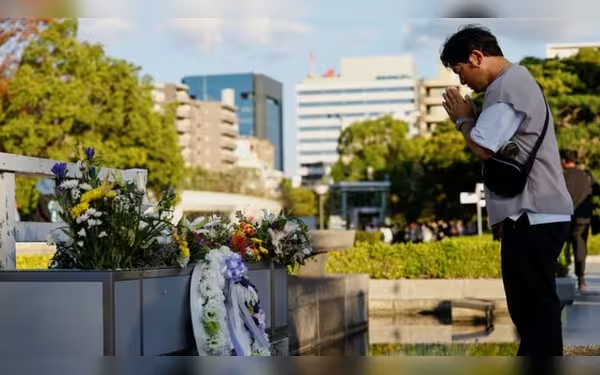Saturday, November 16, 2024 09:57 PM
Nihon Hidankyo Awarded Nobel Peace Prize for Anti-Nuclear Advocacy
- Nihon Hidankyo recognized for anti-nuclear efforts.
- Hibakusha's stories inspire global opposition to nuclear weapons.
- Nobel Prize highlights ongoing struggle for nuclear disarmament.
 Image Credits: channelnewsasia
Image Credits: channelnewsasiaNihon Hidankyo, a group of atomic bomb survivors, awarded the Nobel Peace Prize for their anti-nuclear advocacy and personal testimonies.
The 2024 Nobel Peace Prize has been awarded to Nihon Hidankyo, a grassroots organization formed by survivors of the atomic bombings in Japan during World War II. This significant recognition highlights the ongoing struggle against nuclear weapons and the importance of sharing personal stories to foster understanding and change. The atomic bombs dropped on Hiroshima and Nagasaki in August 1945 resulted in the deaths of over 100,000 people, leaving a lasting impact on the survivors, known as hibakusha.
In the years following the bombings, discussing the events was largely considered taboo, partly due to American censorship in occupied Japan. However, a pivotal moment occurred in 1954 when a nuclear weapons test at Bikini Atoll released radioactive fallout that affected a Japanese fishing boat, the Lucky Dragon. This incident led many hibakusha to come forward and share their harrowing experiences, ultimately leading to the formation of Nihon Hidankyo in 1956.
Since its inception, Nihon Hidankyo has played a crucial role in the global anti-nuclear movement. The organization has worked tirelessly to raise awareness about the dangers of nuclear weapons and to advocate for their abolition. The Nobel Committee acknowledged their efforts, stating that the hibakusha's testimonies have helped generate widespread opposition to nuclear weapons around the world.
One notable example of their activism occurred in 1975 when a group of hibakusha, including Setsuko Thurlow, organized an exhibition on the atomic bombings at the Toronto public library. This event sparked a significant anti-nuclear movement in Canada, leading to tens of thousands of Canadians protesting against their government's support for U.S. nuclear weapons by the early 1980s.
Furthermore, in 1984, Takashi Morita, another survivor of the Hiroshima bombing, co-founded a hibakusha organization in Sao Paulo, Brazil. This initiative aimed to share their stories and raise awareness about the devastating consequences of nuclear weapons in South America. The growing awareness of hibakusha experiences throughout the 1980s inspired protests across Europe against the deployment of new nuclear missiles, with the slogan "no Euroshima!" becoming a rallying cry for the European peace movement.
Nihon Hidankyo's efforts have not only focused on sharing personal stories but also on advocating for the abolition of nuclear weapons globally. The organization has been a strong supporter of the United Nations treaty prohibiting nuclear weapons, which came into force in 2017 and has been signed by 94 countries. This treaty represents a significant step towards a world free of nuclear threats.
The recognition of Nihon Hidankyo with the Nobel Peace Prize serves as a powerful reminder of the importance of listening to the voices of those who have suffered the consequences of war. The hibakusha's stories are not just historical accounts; they are urgent calls to action for a safer, nuclear-free world. As we reflect on this award, it is essential to remember that the fight against nuclear weapons is far from over, and the lessons learned from the past must guide our future actions.













